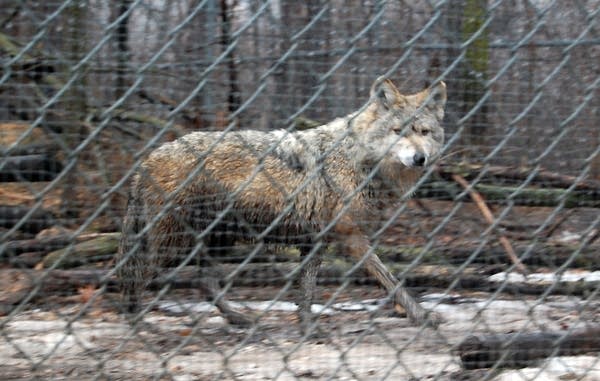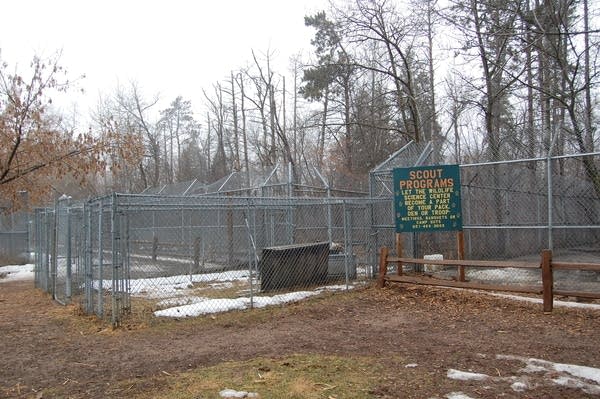Wolf, sprung from her pen, rejected by sisters on return
Go Deeper.
Create an account or log in to save stories.
Like this?
Thanks for liking this story! We have added it to a list of your favorite stories.

Someone broke in to the Wildlife Science Center in Forest Lake, Minn. last month, and pried open the enclosure of three Mexican gray wolves.
The three are sisters from the same litter -- they range in color from dark brown to light brown, and are nicknamed Dark Toast, Medium Toast and Light Toast.
Only Medium Toast took the opportunity to leave that morning.
"I have to say I was a little surprised she split," said Peggy Callahan, executive director of the center.
Turn Up Your Support
MPR News helps you turn down the noise and build shared understanding. Turn up your support for this public resource and keep trusted journalism accessible to all.
Callahan said the 4-year-old wolf had led her pack since birth. She had never been in the wild before.
"She left, they didn't, and why I'm not sure," Callahan said. "But I know from some great folks in the public she was having fun at first. She really did."
That was the beginning of a chase that lasted four days. Callahan ran through countless backyards with a net in one hand and a tranquilizer gun in the other, to try to catch the wolf.
People stood on their porches and pointed or yelled the way.

The wolf was finally found near a highway in New Brighton. She was unhurt but exhausted, hungry and worn.
Callahan and her staff were relieved. They cleaned her up, ran tests to make sure was OK, and put her back in her shelter with her sisters.
"She got in there and she acted like she always had. She was kind of queen of her domain," Callahand said. "And then the stimulus was gone -- the press trucks -- and then she crashed. She crashed hard."
Four days later, Callahan saw things weren't just going to go back to normal.
"That day I had a tour group. We walked out at 10 o'clock in the morning. Of course they were excited to see her. We walked out and she had blood streaming from her hip and from her side."
The captive pack acted like a pack in the wild. When a leader's weak, other pack members try to take over.
The captive pack was working just like a pack in the wild. When a leader's weak, other pack members try to take over.
Callahan thinks one sister attacked from the rear and another from the front. She says they saw Medium Toast was weak, and took action.
"I'm going to guess who the leader of the attack was -- the lightest colored female in here. Her face had multiple bites," she said. "My guess is she started it. And the other female was opportunistic and took advantage. I think what they ended up dealing with was an opponent that fought back."
Callahan reported the attack to federal officials in charge of the Mexican wolf breeding program.
"Our heart sank. We knew it was over for her here," she said. "We were really excited and proud to have her back, and now that's gone, too."
The Forest Lake Wildlife Center has been breeding wolves for more than two decades.
They're part of a federal program to reintroduce the species. It started in the late 1970s, when the population of Mexican gray wolves was down as low as seven. Now there are 150 in captivity and about 45 in the wild.
The government decided to take Medium Toast away and try to mate her with a male somewhere else. She will leave in a few weeks.

"I think it's frightening to be attacked. At this point she's very stressed. She's in a new enclosure by herself," Callahan said. "She's very fearful. We limit any contact we have with her to feeding, watering, that's it."
"These two, on the other hand, have been incredibly vocal," Callahan said, referring to the other two wolves as they circled the back of their enclosure nervously. Callahan says she can't yet tell who's in charge now. The sisters may not have decided yet, either.
"[Now we have] two fairly similarly sized females who are looking at each other and saying, 'OK, now what do we do?'" Callahan said. "At some point something's going to happen. It doesn't have to end in a fight. It can just be one saying, 'OK, you are stronger and more frightening than me.' And they just acquiesce."
Police say it's not clear who broke in to the Wildlife Center or why. Callahan said she is sure it was animal rights advocates trying to liberate the wolves.
The Wildlife Center is spending $50,000 on security upgrades.
The whole incident has reminded Callahan that wolves are wild animals, not pets -- and people shouldn't be surprised when they act that way.





